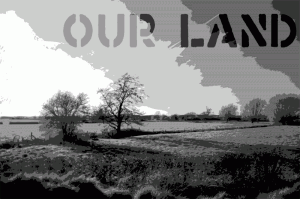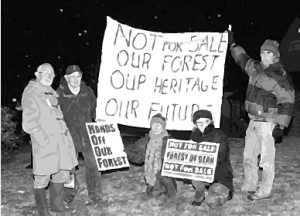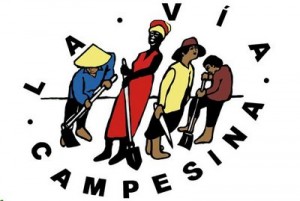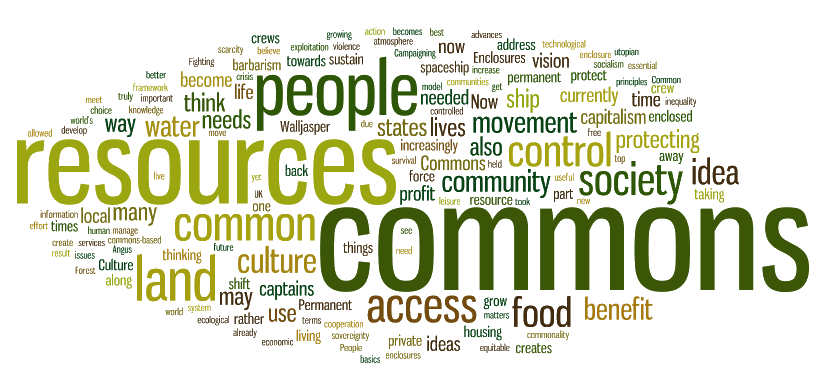A small tale:
Hey, get off my land!
Your land?
That’s right. My land!
What makes this “your” land?
My Dad gave me this land.
Where did your Daddy get it?
From his Dad, all the way back to my great grandfather.
So, how did he originally get this land?
My great grandfather fought for this land!
Well then, I’ll fight you for it….
What is the Commons?
The idea of the commons is experiencing a resurgence and rightly so in a time wh en access to resources becomes more limited and increasingly corporatised for the benefit of the few to the detriment of the rest of society.
en access to resources becomes more limited and increasingly corporatised for the benefit of the few to the detriment of the rest of society.
The commons historically refers to land that was used to grow food that was controlled by the local community to provide for the local community’s needs. The opposing force that destroys the commons is the enclosure. Enclosures occur when common resources are stolen or taken control of by private interests in the pursuit of profit thus destroying the essence of commonality, as the commons becomes policed and restricted to those with power and economic force to the detriment of all.
In terms of the land it was the Enclosures Acts in the England that took the common land away from the people, forcing them into a wage-based economy out of their control. Today we see the many resources needed to sustain life as enclosed, be it food, land, knowledge, culture, technology, buildings, public services and the welfare state (ironically all of which have been built on the labour of the many). As Trapese states:
“All of us are facing what is called a ‘new enclosure’ where our communities and lives are enclosed and privatised as they are stripped of the items essential for life – be it clean water, access to decent education, affordable housing, or enough land to grow food.” (p.3)
Why the Commons is Common:
People may struggle to grasp the idea of the commons initially, as the mindset of our times is dominated by the ideas of private property (in terms of resource and ideas) and growth through profit as the driver of progress. The idea of the commons is the opposite of this: it is a model of society that respects and protects the resources of the commons in order to manage them for the benefit of all.
Enclosures are detrimental because they create scarcity, which creates dependency which in turn creates external control. The outcome of this is that we lose control over our own lives and the way we live them and more importantly, short-term profits drive decisions, not what is best for society.
The idea of commons is the reverse of this. Communities, rather than being controlled, can utilise resources to best meet their needs so people have more control over their lives. This is because they have access to resources for the basics of survival and access to the ideas and developments of the human race. This is not to say that there could not be some market-based exchanges in society, but they should not be allowed to undermine the basic principles of the commons.
 If people look back to the 1960s where the vision of the future was one of people having more leisure time and their needs being met by technological advances, who can forget the monorails and robots making your meals? We were promised a life of leisure if we all work to develop society now. Obviously this was a western-centric utopian vision, but what is interesting about this is the fact that there was the idea that we would all benefit from advances based on our effort and the effort of those who came before us.
If people look back to the 1960s where the vision of the future was one of people having more leisure time and their needs being met by technological advances, who can forget the monorails and robots making your meals? We were promised a life of leisure if we all work to develop society now. Obviously this was a western-centric utopian vision, but what is interesting about this is the fact that there was the idea that we would all benefit from advances based on our effort and the effort of those who came before us.
In reality what has happened is an increase in working hours, an increase in exploitation and inequality as a result of modern day enclosures where technological advancements, information and resources have furthered been removed from the commons.
We are now facing a time where there is an ever-growing global population and an ever-decreasing amount of resources which is problematic an insoluble problem. There are people who would like to retain the enclosures of the past, but this can only result in a further intensification of competition for resources at all levels whether they be individual, community and state/country. This leads us down a very difficult road as we all scramble for the last remnants of the world’s resources resulting in potential war and violence. This is where we get to the socialism or barbarism argument, where ‘socialism’ is the fair and equitable distribution of resources and ‘barbarism’ is the battles over resources that intensify as they deplete.
As Angus states about this development of capitalism and barbarism.
“Immense improvements to the human condition have been made under capitalism – in health, culture, philosophy, literature, music and more. But capitalism has also led to starvation, destitution, mass violence, torture and even genocide – all on an unprecedented scale. As capitalism has expanded and aged, the barbarous side of its nature has come ever more to the fore.” (Angus p.26)
A useful metaphor is to think of the world as a big spaceship and we are its crew. Currently our spaceship is running out of fuel, food, water and the crew size is growing. Everyone is on this spaceship and there is nowhere else to go and currently the ships atmospheric control system is being eradicated along with the crews’ living space. This ship has many captains and crews on it and these captains don’t necessarily get along and at times you would not think they are part of the same ship. The crew is aware that they are part of the ship and at times they speak to other crews and are beginning to see that these captains aren’t all that great. Now we can save the ship and all be happy or we let the captains destroy the ship completely and us along with it.
A Commons Movement, Commons in Action:
“It’s not necessary that everyone adopt the word commons. What matters is that people understand that what we share together (and how we share it) is a important as what we possess individually.” (Walljasper, p.4)
You may already have been involved in a movement to protect the commons, yet not understood it in that way. Any campaign or action to protect or create resources for use of all can be seen as a movement of the commons.
protect or create resources for use of all can be seen as a movement of the commons.
- Campaigning against climate change is about protecting the common atmosphere.
- Fighting to stop deforestation is about protecting common plants.
- Campaigning against the closure of a local park, swimming pool, library is about protecting commons of the community.
- Fighting to stop cuts to local services is about protecting commons.
- Guerrilla gardening is about taking back land for common use.
- Providing free information online through websites and blogs is building the commons.
- Setting up collectives to organise and meet needs is a version of the commons.
This is why the idea of the commons is so crucial to a Permanent Culture Now because it provides a framework to think about things these ideas and also offers a practical way to address the issues of inequality of the our age. Peter Linebaugh, a historian on the commons, defines action to protect or develop commons as the act of ‘commoning’. It can also be a useful tool of self reflection to think about what we do in our everyday lives and how that affects what is held in common as it gives a framework for us to think about resources and actions. The commons movement allows people to become united across many wide movements and campaigns and avoids the dogmatic adherence to ideology, focusing rather on the pragmatic solutions to issues.
As David Bollier states
“A commons arises whenever a given community decides it wishes to manage a resource in a collective manner, with special regard for equitable access, use and sustainability.” (Walljasper p.5)
The commons movement seeks to reclaim what is rightfully everyone’s. This is a rapidly growing movement that exists in all aspects of culture through the creative commons software model, to land reform campaigns, to community gardens to community libraries. We believe that reclaiming the commons is key to producing a permanent culture now.
A Common Permanent Culture Now?
Often when people talk about permaculture and alternative ways of living they often neglect to address the real issue that stops people from taking up these practices, that of access to resources. We at a Permanent Culture Now are interested in all people being part of a more sustainable and better future, from the people living in slums, tower blocks, housing estates, the homeless and all other groups currently excluded from access to essential resources that enable this.
People with excessive sums of money have been allowed to buy up land for their own benefit. We are not thinking of the downsizers buying small holdings; rather, we are talking about very wealthy individuals and corporations that are enclosing all the available land for their own benefit. The upshot of this is that it creates a situation where huge swathes of people do not have access to the resources needed to move towards a permanent culture.
 The solution to this is to remove those common resources from the marketplace and place them back in the commons for people to use for the benefit of humankind and not profit. This is possible as countries have regained control over the resources needed to sustain them such as in Argentina when private company Suez Lyonnaise des Eaux took over the responsibility of providing water from the state. Not surprisingly, water rates doubled and the quality of water decreased. Ultimately, due to this exploitation residents refused to pay their bills and forced the company to leave the country. There is also a campesina movement (the peasants way) which advocates food sovereignty and people being able to grow their own food on their own land which, as a consequence builds resistance to top down reforms that take away food sovereignty. The Hands Off Our Forest Campaign which stopped the sell-off of the Forest of Dean and many other forests in the UK was about protecting common resources and was supported by people of all political persuasions.
The solution to this is to remove those common resources from the marketplace and place them back in the commons for people to use for the benefit of humankind and not profit. This is possible as countries have regained control over the resources needed to sustain them such as in Argentina when private company Suez Lyonnaise des Eaux took over the responsibility of providing water from the state. Not surprisingly, water rates doubled and the quality of water decreased. Ultimately, due to this exploitation residents refused to pay their bills and forced the company to leave the country. There is also a campesina movement (the peasants way) which advocates food sovereignty and people being able to grow their own food on their own land which, as a consequence builds resistance to top down reforms that take away food sovereignty. The Hands Off Our Forest Campaign which stopped the sell-off of the Forest of Dean and many other forests in the UK was about protecting common resources and was supported by people of all political persuasions.
We are not being utopian in this vision as we believe that as pressure increases on the world’s resources there will be no choice but to free up land and resources that sustain all our communities. Why should the land and forests in the UK be privately owned and exploited for profit when instead it could be utilised for the common good? This not only applies to the basics for survival – such as energy, water, food and housing – but also the access to knowledge and science that is currently enclosed through the use of patents and copyright.
Moving to a commons-based society will mean a fundamental shift in thinking away from individualism towards cooperation and this may be challenging to populations that have been force fed the idea of the market as the solution to all our needs. It may mean giving up some of the things we value as consumption will definitely have to decline due to scarcity of resources. However, as more resources become held in common then we may have more access to those things that make life easier. If we can move towards a commons-based society then our lives will become richer and more fulfilling as we will have more control over the way we live.
Despite what we are told humans thrive through cooperation and mutual aid and have an innate need for social interaction and  commonality with others. This is why the commons is integral to a permanent culture now as Chris Carlsson states in his Nowtopia book about a shift in thinking that is occurring:
commonality with others. This is why the commons is integral to a permanent culture now as Chris Carlsson states in his Nowtopia book about a shift in thinking that is occurring:
“In the context of a global ecological crisis, a crisis of commons that is already centuries old, and the increasingly urgent necessity of shifting how we choose what work is done and how to do it, a new kind of class consciousness is taking shape.” (p.44)
If we were to highlight one commons that is truly under threat, it is the earth’s atmosphere. This is such a fundamentally important resource that we all need to survive yet currently we have very little control over damage being caused to it. This is truly a commons issue that will become increasingly more relevant as time goes on and one that we will have no choice but to address. As Walljasper states:
“To deliver us from current economic and ecological calamities will require more than administering a few tweaks to the operating system that runs our society. A complete retooling is needed – a paradigm shift that revises the core principles that guide our culture from top to bottom. At this historical moment, the commons vision of a society where “we” matters as much as me shines as a beacon of hope for a better world.” (p.6)
Referenced materials:
All That We Share ‘A Field Guide to the Commons’ – Walljasper
Do It Yourself: A Handbook for Changing the World – Trapese
If Socialism Fails: The Spectre of 21st Century Barbarism – Ian Angus
Nowtopia – Chris Carlsson

